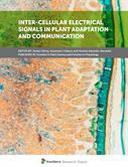Explore

Inter-cellular Electrical Signals in Plant Adaptation and Communication
0 Ungluers have
Faved this Work
Login to Fave
Plants use the Sun's energy to synthesize the basic biomolecules that make up all the organic matter of all organisms of terrestrial ecosystems, including ourselves. Therefore, understanding their adaptive mechanisms to variations of environmental factors, both biotic and abiotic, is fundamental, and particularly relevant in the current context of rapid climate change. Some of the most important adaptive mechanisms of plants are the electrical and chemical signaling systems for the exchange of information between proximally and distally located cells. These signalling systems allow plants to dynamically coordinate the activities of all cells under a diversity of situations. In this Research Topic, we present eight articles that bring up new hypothesis and data to understand the mechanisms of systemic electrical signaling and the central role that it plays in adapting the whole plant to different stresses, as well as new findings on intracellular calcium and nitric oxide-based signaling pathways under stress, which could be extrapolated to non-plant research.
This book is included in DOAB.
Why read this book? Have your say.
You must be logged in to comment.
Rights Information
Are you the author or publisher of this work? If so, you can claim it as yours by registering as an Unglue.it rights holder.Downloads
This work has been downloaded 220 times via unglue.it ebook links.
- 92 - mobi (CC BY) at Unglue.it.
- 66 - epub (CC BY) at Unglue.it.
- 62 - pdf (CC BY) at Unglue.it.
Keywords
- action potential
- Arabidopsis
- circumnutation
- Environmental stress
- intracellular calcium
- Ion Channels
- medicine
- Nitric Oxide
- phloem
- Photosynthesis
- Physiology
- plant electrophysiology
- Pre-clinical medicine: basic sciences
- thema EDItEUR::M Medicine and Nursing::MF Pre-clinical medicine: basic sciences::MFG Physiology
Links
DOI: 10.3389/978-2-88945-521-8Editions

